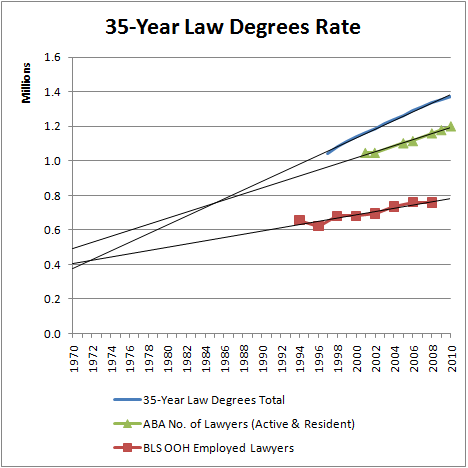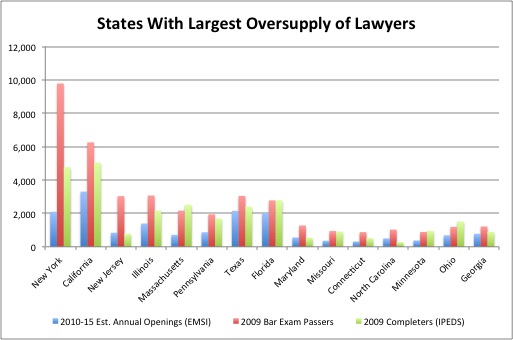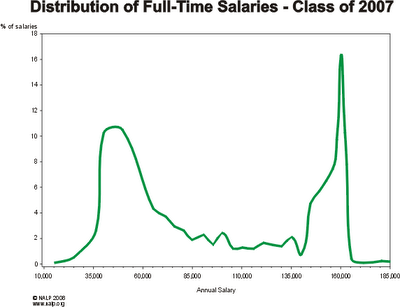The law school bubble – At 50 law schools, 20% of the students are either unemployed, flunked out, or are unknown yet data does not show up in national rankings. Many more pass bar exam than actual job openings in legal field. Legal bubble is another tangent of the higher education bubble.
- 6 Comment
The higher education bubble has gotten a solid amount of press coverage in the last couple of years. Even with student loan debt lurching towards the $1 trillion mark the higher education bubble train keeps moving along. Part of this has to do with the odd financialization of higher education where things are so extreme that someone with no job can suddenly enter into a for-profit paper mill and go into massive government backed debt and actually be worse off. Forget about an affordable community college when you can study video game design from your futon. You might say this is low hanging fruit to pick on.  But what about the law school market? Surely those pursuing the degree of most governmental representatives know a thing or two about political trends and some basic economics. Right? The statistics reveal a somewhat troubling picture within the higher education bubble and highlight a market saturation of lawyers, but also law schools pumping stats as if they were hocking adjustable rate mortgages at the height of the housing bubble. The data is somewhat revealing.
The law school bubble
There is always an argument that there is a shortage of attorneys from law schools but the figures show a very differing picture:
“(Law School Tuition Bubble) The market for new law schools solely depends on demand for legal education. It is wholly divorced from demand for legal services. If there were a connection, enrollments would drop in half starting this fall, probably more to account for the large number of Juris Doctor-holders who aren’t employed as lawyers (cyclically or otherwise).â€
What the above data shows is rather fascinating. There is an abundance of attorneys out in the market. Any thinking person would quickly realize that it would be quicker to pull people off of the idle sidelines and put them back to work. This isn’t like a lost manufacturing workforce being shipped off to sea after all. These are American trained attorneys who presumably have an understanding of American law and practice.  So why the continued growth? Well part of this has to do with the higher education bubble mentality and insane access to student loan debt.
Law schools and those who rank them are quick to shelter certain statistics but things may look darker than what is being presented to prospective applicants:
“(Annaivey) At 50 law schools, 20% of the students are either unemployed, flunked out, or are unknown, yet the ABA and LSAC disavow the use of data to rank law schools.â€
So obviously removing a large cohort like this will skew data. And when you are charging $120,000 for a law education, that data may not be that useful in recruitment. Part of this growth has to do with many lower-tier law schools sucking in students and using big law firm pipe-dreams to lure in students into massive debt traps. Maybe the assumption is many applicants don’t even have a basic economics course under their belt? Take a look at this interesting chart of Bar completion rates versus actual legal job openings:
Source:Â Â Â Â Consumer Law and Policy Blog
Take for example New York where nearly 10,000 passed the bar exam yet openings only amounted to roughly 2,000 spots. And this is where the big law firms are at that many are given an implied whiff at. So many will go to other states right? Well look at the data there as well. You have students passing exams in all big states at much higher levels than actual openings. This is why you get comments like the below from a dean of a law school:
“It’s a leadership responsibility that each of us has. And damn the U.S. News if it affects our rankings. The kids are not gonna show up. Do you know that LSAT registrations are flat to down this year. That students’ applications to law school are flat to down in a substantial number of law schools. That’s never happened in a downturn in the economy before. They’re catching on. Maybe this thing they are doing is not so valuable. Maybe the chance at being in the top 10% is not a good enough lottery shot in order to effectively spend $120,000 and see it blow up at the end of three years of law school.â€
This is a key point in the higher education bubble when it comes to law school. Without a doubt, there are big salaries to be had in law but the salary distribution is not as favorable as some would think:
“(The Stopped Clock) For years, it made economic sense for smart, ambitious 22-year-olds to pay the escalating price for a legal diploma. Law schools have had a monopolist’s hold on the keys to corporate lawyerdom, which pays graduates six-figure salaries.
But borrowing $150,000 or more is now a vastly riskier proposition given the scarcity of Big Law jobs. Of course, that scarcity hasn’t been priced into the cost of law school. How come? In part, it’s because schools have managed to convey the impression that those jobs aren’t very scarce.†[emphasis added]
Keep in mind this chart is favorable since it looked at stats for the 2007 graduating class that locked in salaries before the economy went flying off the Grand Canyon like debt cliff. It seems that a big winning group here is the salaries of law professors but this is like looking at the revenues of paper mill for profits. This is more a symptom of the problem rather than a cure. The salary of law professors is high because demand for these degrees is still relatively good. Students still want the chance to reach into the top 10 percent echelon of graduating attorneys to make that six-figure income but the chart above is more sobering. Of course I doubt this is presented in any law school recruitment pamphlet.
A large portion of those going to lower-tier law schools with massive debt are setting themselves up for massive disappoint and are simply one tiny facet of the $1 trillion student loan bubble. There might be a silver lining and that is students are waking up:
“(Above the Law) The report indicates that as of 1/13/12 ABA applicants are down 16.7% and ABA applications are down 15.3% from 2011. The report also indicates applicants to Canadian law schools are up 4.4% and applications are up 5.4% from 2011.â€
This goes in line with the reality that the higher education bubble is primed for popping. Can it be that many prospective law school applicants are understanding the above data and don’t want to roll the $120,000 dice just to see if they can cut into the top 10 percent of the graduating class of law students for that coveted six-figure salary job that is clearly limited? As many are starting to realize debt does come at a heavy cost if you invest in an asset at an inflated value. At the moment, law schools seem to fall into this category.
If you enjoyed this post click here to subscribe to a complete feed and stay up to date with today’s challenging market!6 Comments on this post
Trackbacks
-
Donnie said:
Additionally,many of the top tier associate positions are by invitation and sponsorship only. According to government studies the average income for a working lawyer is $62,000 nationwide. And this does not include attorneys working in other fields.
January 31st, 2012 at 5:22 am -
Dumbfounded said:
This is a great article, one of your finest. Please keep up the great economic journalism.
January 31st, 2012 at 8:52 am -
Joe B. said:
But if you look at the ABA/BLS ratio, it is pretty consistent. So the probability of acquiring a job is about the same over the past 40 years.
January 31st, 2012 at 6:56 pm -
Cheryl said:
This is really old news. I graduated law school in 2001 and it was the same story then. law schools are a cash cow for universities: charge through the nose and barely any infrastructure needed. They try to maximize the class size and don’t mention anything about the real prospects for future employment as an attorney.
As a corporate paralegal I now make more than 2X what I did as an attorney. My loans are paid off and I have a nice 9-5 cushy job.
The real tragedy is that there is so much need for legal services among the poor/middle class, but they just can’t afford it. And I couldn’t afford to work in an attorney sweatshop and have any kind of decent life and pay off my loans.
Yet, the law schools keep churning out tons of fresh JDs who don’t understand the job market and that the majority will have to work for peanuts to get experience.
February 1st, 2012 at 10:20 am -
Terrance said:
Universities and Colleges are in business to make money whether they be private of public. Attorneys as a group are not particularly gifted as a group, though many indiviually are. An over abundance of hungry attorneys is liable to further diminish our economic output as they have the ability to interfere with those who concretely produce goods & products or otherwise needed services. I know a man who serves his country who left to go to the Middle East, while he was there he was rocketed and mortared. Upon return I had never seen him so relaxed, his answer was he was not allowed to be hectored by his spouse’s attorney while deployed. Near physical death was less stressful then a two year Pennsylvania divorce. In a version of the game Civilization III lawyers are considered anoher arm of the combat machine.
February 1st, 2012 at 6:06 pm -
dollardement said:
law degrees from the ivy leagues were reserved for the creme de la creme and the elite,but over the last two decades,avenues like engineering,medicine,law and more conservative careers have taken a back seat ever since the advent of the internet.This is primarily the main reason for quality grads from top universities shifitng to IT related courses.
February 3rd, 2012 at 2:13 am



 If you enjoyed this post click here to subscribe to a complete feed and stay up to date with today’s challenging market!
If you enjoyed this post click here to subscribe to a complete feed and stay up to date with today’s challenging market!